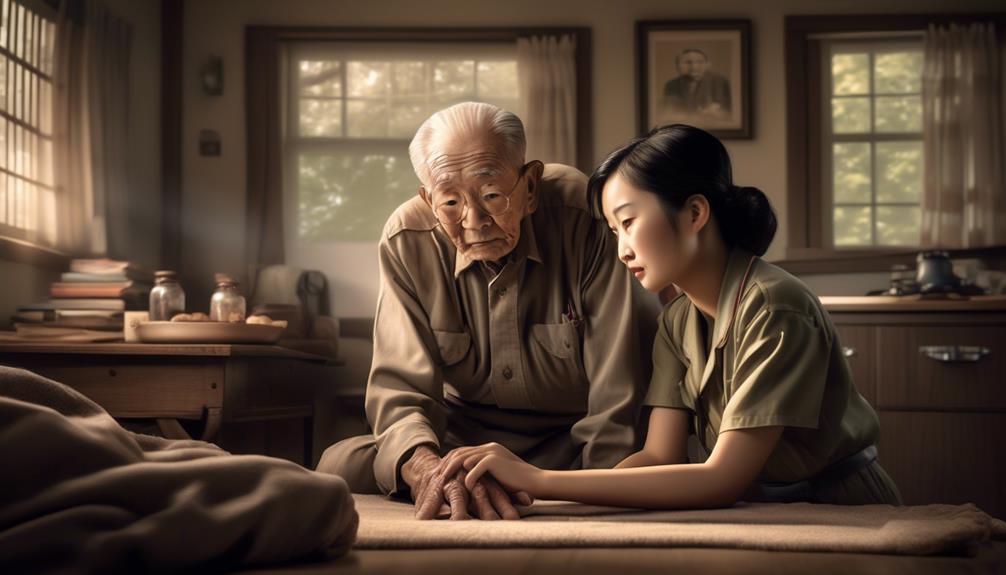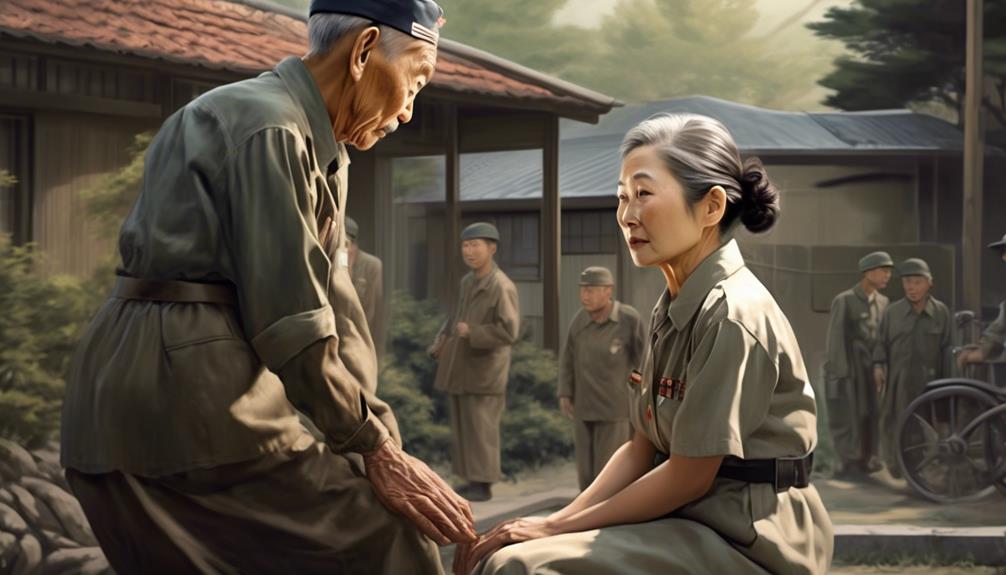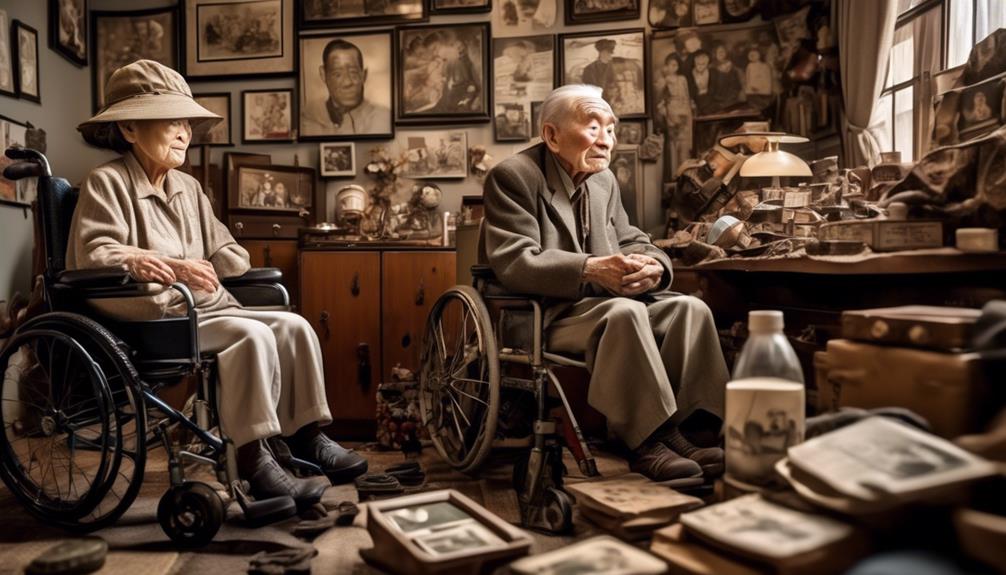Exploring the difficulties of caring for a World War II veteran and former Japanese prisoner of war, we face unique obstacles that require strength and empathy.
The dynamics between a daughter caregiver and her uncooperative father, who carries the weight of his wartime experiences, present a poignant yet intricate narrative that demands careful navigation.
Join us as we explore the multifaceted layers of emotions, strategies, and support systems essential in providing care for aging parents with a traumatic past, shedding light on the profound journey of daughter caregivers in such circumstances.
Key Takeaways
- Understand father's trauma
- Implement distraction techniques
- Seek support for caregiver
- Balance respect and safety
Challenges of Caregiving for WWII Veteran
Caring for a WWII veteran like Vanessa Brooks' father entails navigating the complex and unique healthcare needs stemming from his service. As family caregivers, we understand the challenges that come with providing care to a veteran who may be dealing with PTSD. WWII veterans, like Vanessa's father, often carry the invisible scars of war, which can manifest in various ways, impacting their daily lives and interactions.
When caring for a WWII veteran with PTSD, it's essential to approach the situation with empathy and patience. Understanding the veteran's experiences during the war can help us tailor our care to meet their specific needs. These veterans may exhibit behaviors that are a result of their trauma, requiring us to respond with sensitivity and compassion.
As family caregivers, we may also experience emotional strain when caring for a WWII veteran with PTSD. It's crucial for us to seek support for ourselves while providing care for our loved ones. By acknowledging the unique challenges faced by WWII veterans and their caregivers, we can ensure that they receive the care and respect they deserve.
Strategies for Dealing With Uncooperative Behavior

When faced with uncooperative behavior in dementia patients like June's father, understanding the underlying causes is crucial for effective management. Caregiving research suggests that behaviors like confusion, frustration, or fear can drive this resistance.
To address such challenges, implementing distraction techniques, such as engaging in familiar activities or redirecting attention, can effectively diffuse difficult situations. Maintaining a calm and patient demeanor is essential; this approach helps prevent escalating confrontations and fosters a more supportive environment.
Establishing a consistent routine and familiar environment can provide a sense of security, reducing triggers for uncooperative behaviors. Seeking guidance from healthcare professionals, support groups, or dementia specialists is also beneficial. These resources can offer valuable insights and strategies for managing and addressing uncooperative behavior effectively.
Navigating Trauma From Japanese POW Experience
James Oka's journey as a Japanese POW during WWII has deeply shaped his mental well-being and behavior, presenting unique challenges for his daughter June as his caregiver. The trauma from his time as a POW has created complexities in providing care for him, requiring a delicate approach that acknowledges his past experiences and their lasting effects.
To navigate this challenging situation effectively, we must consider:
- Understanding Care Needs: Recognizing the specific care needs stemming from James Oka's traumatic past is crucial in tailoring caregiving strategies that address his emotional and psychological well-being.
- Acknowledging Intergenerational Trauma: June's caregiving journey isn't just about the present; it involves unraveling the intergenerational trauma passed down from her father's POW experience, which influences their dynamic and communication.
- Creating a Supportive Environment: Establishing a supportive environment that fosters open dialogue, patience, and empathy is essential in managing the complexities of caregiving for a father who carries the weight of his wartime trauma.
Balancing Respect and Safety in Caregiving

In navigating the complexities of caregiving for a father with a history of wartime trauma, it is crucial to delicately balance honoring his experiences while ensuring his safety and well-being. This delicate balance requires a thoughtful approach that considers the father's autonomy and dignity alongside his need for assistance and protection. As daughter caregivers, we understand the importance of respecting our father's military service and the challenges he faced as a WWII veteran and Japanese POW. To effectively balance respect and safety, communication and boundaries play a vital role. Here is a table summarizing key considerations in balancing these aspects:
| Key Considerations | Actions | Impact |
|---|---|---|
| Honoring Military Service | Acknowledge his sacrifices and bravery | Boosts morale and self-worth |
| Ensuring Safety | Implement safety measures without compromising dignity | Promotes physical well-being and peace of mind |
| Communication | Foster open dialogue, listen actively, and show empathy | Strengthens trust and understanding in the relationship |
In this journey, seeking guidance from Veterans Affairs and care workers can provide valuable insights and support in maintaining the delicate balance between respect and safety in caregiving.
Seeking Support for Daughter Caregivers
As daughter caregivers like us navigate the demanding role of providing constant care for our parents, the significance of seeking support becomes increasingly evident in sustaining our mental, emotional, and financial well-being.
- Community Resources: Exploring local community resources can provide valuable assistance, such as support groups, respite care services, and financial aid programs tailored to daughter caregivers' needs.
- Online Support Networks: Engaging with online support networks and forums can offer a sense of community, advice, and comfort from individuals facing similar caregiving challenges, helping to alleviate feelings of isolation and stress.
- Financial Assistance: Seeking out financial assistance options, like government benefits, grants, or crowdfunding platforms, can help alleviate the financial burdens that often accompany the caregiving responsibilities, ensuring that daughters can continue to provide quality care for their parents without sacrificing their own well-being.
Frequently Asked Questions
When Should You Stop Being a Caregiver?
We believe that stopping as a caregiver should be based on physical and emotional well-being, safety, and quality care. Signs like burnout, declining health, safety concerns, and inability to meet needs indicate it may be time. Seeking support from professionals and exploring respite care options is crucial.
Assessing limitations and discussing openly with family and healthcare providers are key to transitioning to other care forms for everyone's well-being.
How Do Caregivers Survive?
We survive by leaning on each other and embracing resilience. Establishing routines and finding creative ways to communicate are key.
Engaging in activities that nurture physical and mental well-being is crucial for all involved. Seeking help from community resources, like meal programs, can lighten the load and offer support.
Humor and a positive outlook are our shields in tough times. Advocating for mental health awareness and caregiver support strengthens us on this journey.
What It's Like to Be a Caregiver?
Being a caregiver is both rewarding and challenging. We provide constant care, manage daily tasks, and handle medical appointments. Balancing work and caregiving can be tough, leading to sacrifices.
It's a role that impacts mental, emotional, and financial well-being. Despite the challenges, the bond with our loved ones is crucial. We dedicate ourselves to their well-being, making sacrifices and showing unwavering dedication.
Who Needs Caregiving?
We understand the importance of caregiving and the diverse needs that individuals may have.
It's essential to recognize that anyone, regardless of age or background, might require assistance at some point in their lives.
Providing care involves compassion, patience, and adaptability to cater to the unique needs of each individual.
Our team is here to offer support and guidance through this journey of caregiving.
Conclusion
As daughter caregivers, we understand the challenges of caring for parents with traumatic pasts like WWII veterans. While it may be difficult at times, finding creative strategies and seeking support can help us navigate these complexities.
Remember, it's okay to ask for help and take care of yourself too. Together, we can provide the love and support our parents need while honoring their experiences.









